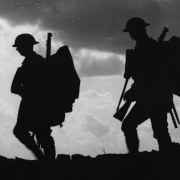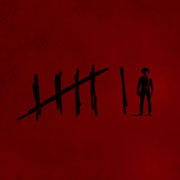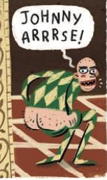|
I love the undercurrents of the meeting of the Generals, and Kronsteen's encounter, the first part of this book is one of those bits I can just sit down and read if I find myself with a lazy afternoon or something. My favourite bit of my favourite bond novel. As an aside, were the generals real or sourced from another publication? Googling some of their names just brings up Bond related sites.
|
|
|
|

|
| # ? May 10, 2024 06:19 |
|
I've been either busy or asleep for most of the last week or so, which means I've just now caught up on this. I really love Fleming's descriptions in general; his verbal portrait of Rosa Klebb makes me feel creatively inferior. All of the commentary on the Soviets is great because I know next to nothing about that bit of history.
|
|
|
Chapter 8: The Beautiful Lurequote:Sitting by the window of her one room and looking out at the serene June evening, at the first pink of the sunset reflected in the windows across the street, at the distant onion spire of a church that flamed like a torch above the ragged horizon of Moscow roofs, Corporal of State Security Tatiana Romanova thought that she was happier than she had ever been before. https://www.youtube.com/watch?v=71oQl46glYs quote:The room was a tiny box in the huge modern apartment building on the Sadovaya-Chernogriazskay Ulitza that is the women’s barracks of the State Security Departments. Built by prison labour, and finished in 1939, the fine eight-storey building contains two thousand rooms, some, like hers on the third floor, nothing but square boxes with a telephone, hot and cold water, a single electric light and a share of the central bathrooms and lavatories, others, on the two top floors, consisting of two- and three-room flats with bathrooms. These were for high-ranking women. Graduation up the building was strictly by rank, and Corporal Romanova had to rise through Sergeant, Lieutenant, Captain, Major and Lieutenant-Colonel before she would reach the paradise of the eighth and Colonels’ floor. Rather than talk about what kind of specific dish she must be making, let's discuss the infamous Soviet cuisine as a whole.  Efforts were made by the Soviet Union to erase the national identity of its individual states as much as possible to create a general Soviet identity. They were also infamous for constant shortages, both due to lack of production and corruption. When combined, these two realities of Soviet life led to the creation of a national cuisine as well. Before the Russian Revolution, the cuisine of Imperial Russia varied from grandiose to barely there depending on your social standing. The wealthy and nobility enjoyed imported foods and embraced international cuisine, especially French. While the peasants would usually be surviving on various soups and rye bread, the Romanovs would have elaborate dishes of jellied meat, roasts, canapes, cheese-filled pastries, and cakes. The French influence didn't totally disappear after the formation of the Soviet Union, but it was heavily simplified. Georgian cuisine was also introduced across Eastern Europe thanks to Stalin being Georgian. The typical dish for a Soviet worker like Tanya would have been soup or stew. Along with the famous/infamous borscht, okroshka was a common one. This was a soup made from a kvass base (a very low-alcohol beer made by fermenting rye bread in water) with various vegetables, meats, and sour cream. Especially in times of hardship, "okroshka" could be made on a base of anything from water to diluted kefir (a fermented milk drink that I absolutely hate) and the ingredients could be chopped hot dogs or canned Vienna sausages, boiled potatoes, and hard boiled eggs. If you could chop it up, it would go in the pot. For solid foods, you've got some variety depending on your wealth and connections. Cutlets, Beef Stroganoff, salads, cabbage rolls, peas, etc. Many workers got their meals outside the home from state-run canteens that served the same food just about everywhere. Restaurants existed that took hard currency, but they often wouldn't have everything on the menu and you would usually just ask "What do you have today?" upon arriving. While modern Russian cuisine is greatly improved and you can generally find whatever you want now, a lot of people still think it's all borscht and potatoes. Overall, Tania's meal is typical and probably close to what she eats at home just about every day. You take what you can get and make it into stew. quote:While she dried her hands, she examined herself in the big oval looking-glass over the washstand.   Tatiana in the movie was played by Daniela Bianchi, one of the relatively few actors from these early Bond films who's still alive today. She's an Italian putting on a fake Russian accent, but shared a connection with the character by being the daughter of an army colonel. She retired from acting and modeling in 1970 and married a wealthy shipping magnate. quote:The girl poured the thick soup into a small china bowl, decorated with wolves chasing a galloping sleigh round the rim, broke some black bread into it and went and sat in her chair by the window and ate it slowly with a nice shiny spoon she had slipped into her bag not many weeks before after a gay evening at the Hotel Moskwa. Her Professor Denikin calls her, and unusually refers to her as Corporal Romanova instead of "Tatiana" or "Tania." That means trouble. He informs her that she's been requested for an interview by Colonel Klebb in 15 minutes, who lives on the 8th floor of their apartment building. He doesn't give her any details and very abruptly hangs up. quote:The girl held the receiver away from her face. She stared at it with frenzied eyes as if she could wring more words out of the circles of little holes in the black ear-piece. ‘Hullo! Hullo!’ The empty mouthpiece yawned at her. She realized that her hand and her forearm were aching with the strength of her grip. She bent slowly forward and put the receiver down on the cradle. As we've gone over, this kind of panic was absolutely normal and expected. An "interview" with the secret police could easily mean torture or execution, possibly for something you didn't even expect to kill you when you did it. You were only in more danger if you were actively involved in the government, as this gave you far more opportunities to gently caress up. quote:As she dressed and washed her face and brushed her hair, her mind went on probing at the evil mystery like an inquisitive child poking into a snake’s hole with a stick. From whatever angle she explored the hole, there came an angry hiss. After learning about how far Beria managed to get in politics despite being a literal serial killer, could anyone ever find Rosa Klebb to be too evil to be in the KGB? quote:Tatiana, frozen by her thoughts, looked again at her watch. Four minutes to go. She ran her hands down her uniform and gazed once more at her white face in the glass. She turned and said farewell to the dear, familiar little room. Would she ever see it again?
|
|
|
|
|
Epicurius posted:the only two countries that sent help were Mexico and the Soviet Union Ideologically motivated help, perhaps. A number of additional countries provided arms to the republicans in order to generate cash and dispose of obsolete ordnance. IIRC Poland was the biggest supplier after the USSR, but Belgium, Czechoslovakia, and others got in on it as well.
|
|
|
|
George Orwell and Ernest Hemingway also both supported the Republicans in Spain
|
|
|
|
poisonpill posted:George Orwell and Ernest Hemingway also both supported the Republicans in Spain Right. As individuals. Individual volunteers came from all over the world (and Orwell's Homage to Catalonia is about his time in the civil war), but neither the British or American government supported the republic.
|
|
|
|
Proteus Jones posted:No joke, this thread has been way more interesting and engrossing that I imagined it would be when it started. Same, thanks for the work you put into these write ups.
|
|
|
|
Jaguars! posted:I love the undercurrents of the meeting of the Generals, and Kronsteen's encounter, the first part of this book is one of those bits I can just sit down and read if I find myself with a lazy afternoon or something. My favourite bit of my favourite bond novel. I think the generals meeting with G were real. But G, Klebb and Kronsteen are fictional.
|
|
|
|
Ivan Serov was real. Serov's betrayal of Beria helped lead to his downfall, and Serov, as a reward, became head of the KGB until 1958, when Khrushchev reduced the visibility of the KGB. He then became head of the GRU (Soviet military intelligence), until 1963, when he was forced out because of the Penkovsky affair and the Cuban Missile Crisis.
|
|
|
Ivan Serov was also a Rosa Klebb of his own. If you'd like, the CIA declassified their 1958 file on him. He was slightly younger than Beria and likewise a youth when the Russian Revolution occurred. Whereas Beria had already gotten himself into hot water for playing with both sides, Serov joined the Red Army as a proud soldier after the civil war had already been decided in their favor. He joined the NKVD in 1939 at almost the exact same time that Beria killed his way into becoming its head. As a commissar of the NKVD, Serov has been held responsible for hundreds or thousands of deaths. He participated in the arrests of the Polish officers who would be killed during the Katyn Massacre. One of his top secret documents, the Serov Instructions, gave information on how to carry out mass deportations of Caucasian people (as in the peoples of the Caucasus, not white people) to the Siberian gulags. He boasted that he could "break every bone in a man's body without killing him". Really, the only thing really noticeable about Serov among his peers is that he wasn't unique in his sociopathic cruelty and capacity for violence. After the war, Serov helped organize the Stasi (the infamous East German secret police that became as notorious as the NKVD). Seeing the writing on the wall when Beria took power after Stalin's death, he quickly saved his own skin by conspiring to betray Beria and avoid being purged himself. He continued his work as the head of the KGB, including personally participating in the Hungarian incident by reporting from the scene of the attempted revolution to the Kremlin and escorting Soviet politicians via armored personnel carrier. As Epicurius said, he was quietly shuffled over to the GRU as Khrushchev tried to make the Soviet Union seem a little less overtly evil. For his failure to achieve a real Soviet victory in the Cuban Missile Crisis and the reveal that his protege Oleg Penkovsky had been a double-agent for the British, he was stripped of his party membership and fired. He spent the remainder of his life in obscurity and died in 1990, never living to see the fall of the country he crossed so many lines for.
|
|
|
|
Chapter 9: A Labour of Lovequote:Outside the anonymous, cream painted door, Tatiana already smelled the inside of the room. When the voice told her curtly to come in, and she opened the door, it was the smell that filled her mind while she stood and stared into the eyes of the woman who sat behind the round table under the centre light. Klebb informs Tania that she's been singled out for a special mission and will be rewarded with a promotion to Captain of State Security upon its completion, completely unheard of for a 24-year-old girl. Klebb collects some French wine and offers Tania some Swiss chocolates, which she finds a little creepy. Little does she know where this chapter is going. quote:Tatiana murmured her thanks. She reached out and chose a round one. It would be easier to swallow. Her mouth was dry with fear of the moment when she would finally see the trap and feel it snap round her neck. It must be something dreadful to need to be concealed under all this play-acting. The bite of chocolate stuck in her mouth like chewing-gum. Mercifully the glass of champagne was thrust into her hand. Tania answers truthfully: she's never wanted to live anywhere but Moscow and has never thought of the pleasures and sights of a foreign culture. She's a product of the Soviet system, born around 1930 and virtually unaware of life that isn't the USSR around World War II. quote:The woman paused. There was girlish conspiracy in the next question. Klebb gives Tatiana some more champagne, which she pushes on her with more than a little urging. She asks one final question: do you find pleasure in sex, and could you enjoy it if it was with a man you didn't love? quote:Tatiana shook her head indecisively. She took her hands down from her face and bowed her head. The hair fell down on either side in a heavy curtain. She was trying to think, to be helpful, but she couldn’t imagine such a situation. She supposed … ‘I suppose it would depend on the man, Comrade Colonel.’ Oh don't worry, Tania. Having sex with an English spy is the least of your worries in this room right now. quote:‘Yes,’ said Rosa Klebb, pleased with the effect of her words. ‘He is an English spy. Perhaps the most famous of them all. And from now on you are in love with him. So you had better get used to the idea. And no silliness, Comrade. We must be serious. This is an important State matter for which you have been chosen as the instrument. So no nonsense, please. Now for some practical details.’ Rosa Klebb stopped. She said sharply, ‘And take your hand away from your silly face. And stop looking like a frightened cow. Sit up in your chair and pay attention. Or it will be the worse for you. Understood?’ Tania wants to know what will happen to her target after she's done, which Klebb is indifferent about. She claims that the real goal is for her to spread false information to the British and learn more about life in Britain. Satisfied, Klebb tells Tania to finish off the chocolates while she goes to clean herself up for a friendly chat. quote:Tatiana sat back in her chair. So that was what it was all about! It really wasn’t so bad after all. What a relief! And what an honour to have been chosen. How silly to have been so frightened! Naturally the great leaders of the State would not allow harm to come to an innocent citizen who worked hard and had no black marks on her zapiska. Suddenly she felt immensely grateful to the father-figure that was the State, and proud that she would now have a chance to repay some of her debt. Even the Klebb woman wasn’t really so bad after all. I'm really glad this part wasn't in the movie. quote:Tatiana stammered, ‘It’s very pretty.’ This is going exactly where you think it's going. quote:‘Turn out the top light, my dear. The switch is by the door. Then come and sit beside me. We must get to know each other better.’
|
|
|
|
|
So, lets talk about what Tatiana is expected to do...or at least what she thinks she's expected to do. In other words, lets talk about the "Honeypot". People take a lot of dumb risks and do a bunch of dumb stuff because of sex. Knowing that, intelligence agencies will sometimes use sex as a method of recruitment. This technique is usually called the "honeypot", and it's basically what you might thing. Your agent seduces or enters into a relationship with someone who's able to give you information, and then the agent either convinces the person to tell them, or now can be blackmailed by your agency. This shows up a lot in espionage fiction, of course, because it lets the writer get a little bit racy and all that, but it's also a real technique. The East Germans were notorious during the Cold War for it. Interestingly enough, when Fleming wrote the book, the Soviets had just used honeypot techniques on a western diplomat. Fleming wouldn't have known about this, obviously, because the information didn't come out until later. Maurice Dejean had had a long career in the French diplomatic corps. He had served in a bunch of positions before the war, and then, after the fall of France, managed to escape to London, where he had been a spokesman for the Free French, and a friend and ally to Charles de Gaulle. After the war ended, he became the French Ambassador to Japan, then Czechoslovakia, and then finally, in 1955, to the Soviet Union. Not too long after getting there, he met a young actress named Larissa Kronberg at a party, Dejean had a taste for pretty ladies, and the two of them started a relationship. Not too long after that, they were having sex at her house, when her husband, a geologist who was supposed to be out of town, came home. He saw the two of them in bed together, and attacked Dejean. The authorities were summoned, and they said to him, basically, "Look, don't worry. We know this is embarrassing, but these things happen. We'll keep this quiet, and we can guarantee that Kronberg and her husband will too. You're an important guest in this country, and a friend of the Soviet Union, and the Soviet Union has no desire to embarrass our guests. Of course, because we know you are a friend of the Soviet Union, if you should happen to come across anything that might hurt France's relationship with the Soviet Union, we know that you'd let us know." Of course, both Kronberg and her "husband" were working for the KGB, and the whole thing had been arranged by them, and now the KGB had an asset in the French Ambassador. Dejean stayed as ambassador until 1963, when a KGB agent defected to British Intelligence, and revealed that he had been compromised. The British passed the information to the French, and Dejean was recalled to Paris, and allowed to retire by de Gaulle. Meanwhile, there's another story about a possible honeypot that happened to another ambassador to the Soviet Union at about the same time. Please note that while we have pretty solid information about the Dejean case, this second is more speculative. I'm including it because there's a good chance that it's true, but there's still a bunch of doubt and speculation. That would be the case of John Watkins, the Canadian ambassador to the Soviet Union from 1954-56. Watkins died in 1964 of a heart attack in a hotel in Montreal. It wasn't until the 1980s that there was a coroner's inquest about the death, and it turned out the heart attack happened during an interrogation session by the Mounties and CIA. They were investigating allegations that that Watkins, as ambassador, had had an affair with another man in Moscow, and that the KGB were using that to blackmail him, and that the heart attack was the result of the investigation. Was it true? Who knows for sure. We do know that just after his death, the Mounties (which had been investigating and purging gays from the Canadian Civil Service from the 1950s) stepped up their investigations came up with a list of 9000 "suspected homosexuals" in Ottawa, and they came up with what they nicknamed the "fruit machine" to test for homosexuality, by exposing the subject to various images and exposing and measuring their reactions. Of course, the KGB didn't just target ambassadors. In 1987, a US Marine named Clayton Lonetree, who had been a guard at the American Embassy in Moscow, was courtmartialed and sentenced to 30 years in prison, after being seduced by a KGB officer while he was stationed there. The KGB then blackmailed him and he turned over floor plans to the US Embassies in Moscow and Vienna, as well as a list of undercover US agents in the Soviet Union. His sentence was later reduced to 15 years, and he was released in 1996.
|
|
|
|
Epicurius posted:We do know that just after his death, the Mounties (which had been investigating and purging gays from the Canadian Civil Service from the 1950s) stepped up their investigations came up with a list of 9000 "suspected homosexuals" in Ottawa, and they came up with what they nicknamed the "fruit machine" to test for homosexuality, by exposing the subject to various images and exposing and measuring their reactions. Ladies and gentlemen, the Horse Gestapo.
|
|
|
|
Sperglord Actual posted:Ladies and gentlemen, the Horse Gestapo. They have neighs of making you talk.
|
|
|
Chapter 10: The Fuse Burnsquote:It was the morning of the next day. I think it's a sign of how valuable Tatiana is to the plot that she didn't get disappeared from her apartment that night. quote:One of the three telephones at her side purred softly. She picked up the receiver. ‘Send him in.’ The film compresses most of these introductory chapters into a scene at a SPECTRE training camp. https://www.youtube.com/watch?v=mFmLAqdPdsY Klebb informs Grant that he's been given an assignment to assassinate an English spy. He'll be put through weeks of training and preparation to imitate an English gentleman, where a double-agent from the British Foreign Office will help him pass as a spy himself. Grant asks no questions and leaves, excited at the prospect of settling some scores with the English and being rewarded. quote:Rosa Klebb was writing up her note of the interview. She didn’t answer or look up and Grant went out and closed the door softly behind him. And now comes the time to talk about the Russian Revolution and Russian Civil War.  The House of Romanov was the ruling noble family of Russia from the time of Michael I's election as Tsar in 1613 until March 15, 1917 when Tsar Nicholas II abdicated the throne. The family line went through some twists, but overall the Romanovs maintained an uninterrupted rule over Russia for 304 years. Discontent with the monarchy dated back a good century by the time of World War I. Cruel treatment of the peasants by the ruling class and poor working conditions were exacerbated over the 19th century by Western-influenced philosophers. In 1848, German philosopher Karl Marx publicized The Communist Manifesto, calling for the oppressed workers of the world to seize the means of production via revolution and control the state directly. But despite the role communists would play in the eventual downfall of the Russian nobility, the first revolution was otherwise unrelated to Marxists. It was a longtime pattern of oppression exacerbated by Russian military defeats in the Great War after Nicholas II attempted to take direct control of the army and very quickly demonstrated that he was an abysmal commander. On March 8, 1917 (it's usually called the February Revolution due to the Russians not switching from the Julian calendar to the Gregorian one until 1918), worker strikes grew to a boiling point. Tens of thousands of workers went on strike and rioted over a lack of food, growing to hundreds of thousands by the next day. Soldiers mutinied and joined the rioters, as they had it no better in the army than in the factories. The rioting continued for several days and ended in over 1300 deaths before Tsar Nicholas II returned from the war front. With the chaos seeming impossible to overcome, Nicholas abdicated the throne and placed his brother, Grand Duke Michael Alexandrovich, in power. Michael deferred acceptance of the throne, as he technically needed to be ratified by an official assembly. This never happened. A conservative provisional government was enacted in the interim, as well as the Petrograd Soviet of Workers' and Soldiers' Deputies (a "soviet" was just the Russian word for "council" at the time), a city council of what we now call St. Petersburg. The Petrograd Soviet represented the common people of the Russian capital and engaged in a power struggle over the coming months with the provisional government, which the Soviet viewed as bourgeoisie. The Bolsheviks, the Russian revolutionary socialist party in the government, had officially been formed into the Communist Party of the Soviet Union in 1912 (which, now with the context, you now know was simply a referring to a union of the workers' councils). Vladimir Lenin returned from his exile in Switzerland to lead the Bolsheviks, whereupon he immediately began undermining the government. As tensions grew and the provisional government repressed the communists over the summer, General Lavr Kornilov attempted a coup that would eliminate the socialists from the government. The coup failed and only inspired further resentment of the provisional government, paving the way for the Bolsheviks to enact a full revolution in November 1917 ("October Revolution" due to the Julian calendar again). The Bolsheviks and their Red Army of revolutionaries seized power over November 7 and 8 with only a few injuries among their number. Lenin formed the Council of People's Commissars as the new government with himself as the chairman. An impromptu four-man council consisting of Lenin, Joseph Stalin, Leon Trotsky, and Yakov Sverdlov acted as the true power behind the government (though Sverdlov was frequently absent from meetings and died in March 1919 from illness). The Romanovs were placed under house arrest in the Ipatiev House, a large merchant's mansion turned into their prison. They were forbidden from speaking any languages other than Russian, had their cameras and valuables confiscated, and were separated from their luggage. As the communists worked to consolidate their power and legitimize their government, monarchists and various anti-communists almost immediately began their own protests and action against the latest revolutionaries. These groups formed what was informally called the "White movement", which was really just a loose confederation of anti-communist forces trying to restore the old government. Many of the states that had been part of the Russian Empire (including Finland, Poland, and Estonia) declared their independence from Russia. This sparked a massive conflict as the Bolsheviks sent the Red Army to defeat the Whites and firmly establish their control over Russia, which would lead to between 7 and 12 million deaths before it ended. As this was going on, the Cheka decided to get rid of Grand Duke Michael, who was imprisoned in a hotel in Perm. They convinced him that they were transporting him elsewhere, then stopped their carriages in the forest and shot him to death. As the Romanovs were having dinner on July 16, 1918, the plan was put into motion. At midnight, the family was awoken and ordered to dress; they were told they were being moved to a safer location due to unrest caused by the civil war. They were brought into a cellar, ostensibly to await a truck. Suddenly, a group of Cheka executioners entered. Yakov Yurovsky, one of the old-timer Bolsheviks, read out their death sentence and the squad immediately raised their pistols and fired. As the family attempted to flee, the executioners fired wildly around the room until it was full of smoke, they were all deaf, and the royal family was dead. The youngest, Alexei, was 13; he survived multiple bullets and bayonet wounds due to having jewels sewn into hidden pockets in his clothes, forcing them to shoot him twice in the head. After stabbing and shooting every body until it was definitively dead, the executioners killed the rest of the royal family's retainers and servants. The bodies were stripped of anything valuable, their clothes burned, and the bodies disfigured with sulfuric acid (plus some facial smashing with rifle butts just in case) and dumped in a mass grave. They even took Alexei's and one of his sister's corpses to burn and smash into bone fragments to confuse anyone who found the grave. Nice people. The Russian Civil War officially ended in 1922, though fighting continued through 1923. The communists had solidified their control over Russia and officially formed the Union of Soviet Socialist Republics. After Lenin's death in 1924, Stalin was given the opportunity to act against his political rivals and gradually became the dictator we all know and love. quote:‘Our grandparents were not called Romanov,’ said Kronsteen dryly. ‘However, so long as you are satisfied.’ He reflected a moment. ‘And this man Bond. Have we discovered his whereabouts?’ The Spektor (renamed Lektor in the film to avoid confusion with SPECTRE) is a fictional device. When we get more details on it, we'll discuss the real machines it was based on. quote:Kronsteen stopped talking. His gaze slowly came down from the ceiling. He rose thoughtfully to his feet. He looked across and into the watchful, intent eyes of the woman.
|
|
|
|
|
Epicurius posted:So, lets talk about what Tatiana is expected to do...or at least what she thinks she's expected to do. In other words, lets talk about the "Honeypot". This approach also famously (and possibly apocryphally) failed in the case of the Indonesian dictator Sukarno, who was absolutely delighted to find out that the Soviets had filmed him having sex with a group of women and had no problems with the film being distributed to his Muslim country. The story goes that he asked for a copy of the film.
|
|
|
|
I think at this point, if you're a person of even nominal importance to any government, never get involved with a hot Russian lady who starts trying to proposition you for sex.
|
|
|
|
|
McNulty.mp4
|
|
|
|
Super Genius World Famous 4D Chess Master Tasked with trapping James Bond: Hmmm, what if..... we send a hot girl to have sex with him? *solemnly bows heads*
|
|
|
|
poisonpill posted:Super Genius World Famous 4D Chess Master Tasked with trapping James Bond: Hmmm, what if..... we send a hot girl to have sex with him? Q: is she super hot A: y Q: have we got a box with SPY STUFF DO NOT STEAL ON IT A: ye s Q: ....... A: ....... Q: k we good let's do it
|
|
|
sebmojo posted:Q: is she super hot As we’ve seen in past books, it would loving work.
|
|
|
|
|
drat skippy.
|
|
|
Chapter 11: The Soft Lifequote:The blubbery arms of the soft life had Bond round the neck and they were slowly strangling him. He was a man of war and when, for a long period, there was no war, his spirit went into a decline. Oh poo poo, Bond is actually in this book! quote:At 7.30 on the morning of Thursday, August 12th, Bond awoke in his comfortable flat in the plane-tree’d square off the King’s Road and was disgusted to find that he was thoroughly bored with the prospect of the day ahead. Just as, in at least one religion, accidie is the first of the cardinal sins, so boredom, and particularly the incredible circumstance of waking up bored, was the only vice Bond utterly condemned. Sea Island cotton is a very soft cotton that originated in South Carolina and Georgia from plantations on the coastal islands. Ian Fleming was a huge fan of it and wore it all the time, so of course he gave it to Bond. Sea Island cotton accounts for 0.0004% of the world's cotton supplies, which means even a simple T-shirt made from it runs around $165 currently. Sunspel did a special James Bond run imitating the 1950s clothing he would have worn, with a polo shirt like the one Sean Connery wore in Dr. No going for $275. It's also interesting to note that (again, presumably like Fleming) Bond prefers to wear an outfit more suited to the tropics while at home. quote:May, an elderly Scotswoman with iron grey hair and a handsome closed face, came in with the tray and put it on the table in the bay window together with The Times, the only paper Bond ever read. Makes sense, as Fleming was an editor for The Sunday Times (its sister paper). quote:Bond wished her good morning and sat down to breakfast. Of course, Bond suspects that the "television salesman" is a spy checking on him to see if he's at home. He decides not to do anything about it for now, beyond making a mental note to tell Security Section and move into a new flat if something serious happens. quote:Bond went back to his breakfast. Normally it was little straws in the wind like this that would start a persistent intuitive ticking in his mind, and, on other days, he would not have been happy until he had solved the problem of the man from the Communist Union who kept on coming to the house. Now, from months of idleness and disuse, the sword was rusty in the scabbard and Bond’s mental guard was down. It's almost comforting being able to leave behind the bleakness of the Soviet Union and get back to Bond's incredibly particular breakfast.  The Chemex is a very popular coffee pot invented in 1941, which was especially stylish in the 50s and 60s. You simply place a proprietary paper filter in the top, fill it with grounds, and pour hot (not boiling) water over it. The thick filter removes additional off-flavor compounds from the coffee and the wood collar allows you to grasp and pour directly from the pot, eliminating the need for any kind of electric coffee maker as long as you have a separate source of hot water.  The Marans is a French breed of chicken that was first imported into the United Kingdom in the 1930s. Brown eggs do indeed taste different from typical white eggs, as the color is indicative of the chicken's diet, but any nutritional differences are negligible. Bond is just really particular here.  Tiptree Little Scarlett is a brand of strawberry preserves produced in Essex since 1885. It's made with Fragaria virginiana strawberries, which are only 1/5 the size of a regular strawberry. They're common in the wild in the United States, but are rarely grown for commercial purposes except for Tiptree. Tiptree was given a royal warrant to supply the crown with Little Scarlett in 1911, making it an extremely prestigious condiment despite being only $10-15 a jar.  Cooper's Vintage Oxford Marmalade is another British condiment with a royal warrant, having been made since 1874. It's a dark, thick marmalade made from bitter Seville oranges. Combined with butter on toast, you'd have a surprisingly complex and rich spread. As for the honey, it came from Fortnum & Mason, a famous London department store founded in 1707 as a grocery. The store still exists and heather honey is relatively easy to find there. All in all, Bond's breakfast at home is just as particular as what he eats on his travels. While "a boiled egg and some toast with coffee" sounds simple on its surface, Bond is making sure that he uses only the best ingredients and elevating it above simple diner fare. quote:That morning, while Bond finished his breakfast with honey, he pinpointed the immediate cause of his lethargy and of his low spirits. To begin with, Tiffany Case, his love for so many happy months, had left him and, after final painful weeks during which she had withdrawn to an hotel, had sailed for America at the end of July. He missed her badly and his mind still sheered away from the thought of her. And it was August, and London was hot and stale. He was due for leave, but he had not the energy or the desire to go off alone, or to try and find some temporary replacement for Tiffany to go with him. So he had stayed on in the half-empty headquarters of the Secret Service grinding away at the old routines, snapping at his secretary and rasping his colleagues. She was too good for him anyway. quote:Even M. had finally got impatient with the surly caged tiger on the floor below, and, on Monday of this particular week, he had sent Bond a sharp note appointing him to a Committee of Inquiry under Paymaster Captain Troop. The note said that it was time Bond, as a senior officer in the Service, took a hand in major administrative problems. Anyway, there was no one else available. Headquarters were short-handed and the 00 Section was quiescent. Bond would pray report that afternoon, at 2.30, to Room 412. Bond describes Captain Troop as the man that unites everyone in the office by being universally hated by them. He's a typical micromanager, obsessing over minor details and meting out punishments for failing to meet his exacting standards. quote:It was inevitable that Captain Troop’s duties would bring him into conflict with most of the organization, but it was particularly unfortunate that M. could think of no one but Troop to spare as Chairman for this particular Committee. The "Burgess and Maclean case" is the case of the Cambridge Five spy ring, one of the most famous cases of a spy ring in the Cold War. It started in the public eye in 1951 when two British diplomats, Donald Maclean and Guy Burgess (code names "Homer" and "Hicks") suddenly disappeared. Five years later, Khrushchev publicly confirmed that they had fled to the Soviet Union. Turns out the two of them had been devoted communists and were working as Soviet spies since the 1930s. Both of them would remain in the Soviet Union for the rest of their lives; Maclean assimilated into Soviet life and even had his wife and children move out to join him in Moscow, while Burgess assimilated even better into Soviet life by becoming a lonely alcoholic and dying in 1963 from liver failure. At the time Fleming wrote this, only the defection of Burgess and Maclean had appeared in the news recently. In fact, there were three more spies, one of which would probably shock the hell out of Fleming shortly before his death: Kim Philby (code name "Sonny" or "Stanley"), the chief British intelligence agent stationed in Washington after the war. Philby was such a prominent agent that he was awarded the Order of the British Empire in 1946 and even assigned to hunt down "Homer". He was suspected, but cleared in 1956. They should have looked a little deeper, as in 1963 he vanished into the Soviet Union. I believe Fleming knew Philby and both of them had a mutual school friend in fellow spy Nicholas Elliott. Philby was disappointed with life in the Soviet Union (though he blamed the leadership rather than communism as a whole) and was denied any real work or rank by the KGB due to fear that he would try to return to London. He attempted suicide shortly after arriving, but ended up dying of heart failure in 1988. Fleming would never know of the other two members of the ring, as their existence wasn't publicized until long after his death. They consisted of John Cairncross (code name "Liszt"), a British Foreign Office agent who passed code-breaking information from Bletchley Park, and Anthony Blunt (code names "Tony" or "Johnson"), a leading British art historian and MI5 agent. Cairncross confessed almost immediately after Burgess and Maclean disappeared, but had his confession covered up and ended up moving to the United States and then Rome. Blunt confessed in 1963 and was given immunity from prosecution and a concealment of his spying for 15 years. Both of them had their roles in the spy ring revealed in 1979, with Cairncross's being confirmed in 1990 by KGB defector Oleg Gordievsky. This little talk about Burgess and Maclean by Bond is an excellent example of how complex the world of espionage is. Even Fleming had no way of knowing that not only were Burgess and Maclean only a portion of the spy ring, but that the third had already confessed to the government and one of his own comrades in the war was a fourth! quote:At once Bond had got into a hopeless wrangle with Troop over the employment of ‘intellectuals’ in the Secret Service. While this conversation is hilarious today, Bond's suggestion of hiring softer intellectuals who are attuned to human nature actually sets him out as the most left-wing voice on an otherwise very traditional committee. quote:How seriously did he feel about the whole question, Bond wondered as, at nine o’clock, he walked out of his flat and down the steps to his car? Was he just being petty and obstinate? Had he constituted himself into a one-man opposition only to give his teeth something to bite into? Was he so bored that he could find nothing better to do than make a nuisance of himself inside his own organization? Bond couldn’t make up his mind. He felt restless and indecisive, and, behind it all, there was a nagging disquiet he couldn’t put his finger on.
|
|
|
|
|
quote:'England is another matter altogether. I think we all have respect for her Intelligence service,' General Vozdvishensky looked round the table. There were grudging nods from everyone present, including General G. 'Their security service is excellent. [...] This is from the meeting of the generals chapter and it goes on at some length. I always think of the Cambridge spy ring when I read it. The Soviet service heads must have had a good laugh if they ever read it.
|
|
|
Chapter 12: A Piece of Cakequote:As it turned out, Bond never had to make a decision on the Committee’s final report. M opens up by asking Bond another personal question; he's been doing that a lot lately. He wants to know how Bond's relationship with Tiffany had been going. quote:Now what? wondered Bond. drat these office gossips. He said gruffly, ‘Well, sir, we did get on well. And there was some idea we might get married. But then she met some chap in the American Embassy. On the Military Attaché’s staff. Marine Corps major. And I gather she’s going to marry him. They’ve both gone back to the States, as a matter of fact. Probably better that way. Mixed marriages aren’t often a success. I gather he’s a nice enough fellow. Probably suit her better than living in London. She couldn’t really settle down here. Fine girl, but she’s a bit neurotic. We had too many rows. Probably my fault. Anyway it’s over now.’ M tells Bond that the head of Station T in Istanbul had received a typewritten message telling him to take a round trip on a ferry from the Galata Bridge at a specific time. Being a daring sort, he actually took the anonymous letter up on its request. After about 15 minutes, a Russian girl walked up to him and began telling him an extraordinary story. quote:M. paused to put another match to his pipe. Bond interjected, ‘Who is Head of T, sir? I’ve never worked in Turkey.’ According to Tatiana, she's been working as a clerk in the MGB's Central Index for years and fell in love with Bond based on his file photo. quote:‘She said you particularly appealed to her because you reminded her of the hero of a book by some Russian fellow called Lermontov. Apparently it was her favourite book. This hero chap liked gambling and spent his whole time getting in and out of scraps. Anyway, you reminded her of him. She says she came to think of nothing else, and one day the idea came to her that if only she could transfer to one of their foreign centres she could get in touch with you and you would come and rescue her.’ The book she's referring to is probably A Hero ff Our Time by Mikhail Lermontov, published in 1840. It's the story of Grigory Alexandrovich Pechorin, a classic Byronic hero who spends his time womanizing and adventuring around the Caucasus. quote:‘I’ve never heard such a crazy story, sir. Surely Head of T didn’t swallow it.’  The Spektor is a fictional machine, but the way it's described is not too different from the most famous of the cryptographic machines: the Enigma. The Enigma machine was actually a commercial product that began being purchased by the German military in the 1920s and served as one of its main methods of encrypting messages. The work the Allies undertook to break the Enigma's encryption were a major drive in the development of computers (first mechanical, then electronic) and turned Alan Turing into a household name. I actually have a video of myself playing with a real Enigma machine at the National Cryptologic Museum in Maryland: https://www.youtube.com/watch?v=5SBNc-lpJXU Each key (which is quite hard to press) is connected to a different lamp, with the position of the rotors determining which lamp lights up. Every time you press a key, the rotors spin; similar to the hands of a clock, the second rotor spins every certain number of first rotor rotations, then the third rotor spins every certain number of second rotor rotations. This changes the lamps in a predictable sequence, which is what allows the message to be decoded: you write down the garbled text from the lamps as the message, then the receiver sets their rotors to the same setting and types the encrypted text to light up the plaintext letters. There was a codebook with a regularly changing list of rotor settings for particular time periods so everyone knew how to set their machines for encrypting and decrypting that day. Because of how it worked, breaking the Enigma code was based around mathematically analyzing the messages to try and determine the rotor settings and which keys must be connected to which lamps. Codebreakers made heavy usage of "cribs", rules of thumb and common mistakes with the operation of the Enigma. Like a letter could never be encrypted to itself, so you could immediately take that letter out of consideration for what the plaintext could be (there was a funny story by Mavis Lever where she found a message without a single "L" in it and quickly determined that the operator had sent a lazy test message by just pressing one key over and over). Or you could find that an identical or almost identical message was sent in a weaker form of encryption through another channel, which would give you the text to help break the Enigma message. What revolutionized it was the development of electro-mechanical computers called bombes. They were essentially brute force machines that could rapidly test different Enigma settings, doing what would take 100 people an entire day in 2 hours. Alan Turing developed the initial British bombe design and continued to work on computers until his homosexuality led to punishment by forced sterilization in 1952; he died two years later by eating a poisoned apple, which was either suicide or a careless accident depending on who you talk to. Honestly, you could talk all day about the Enigma and its cryptanalysis. It's essential learning for anyone even mildly interested in military intelligence, codebreaking, or the history of computers. quote:Bond was sold. At once he accepted all M.’s faith in the girl’s story, however crazy it might be. For a Russian to bring them this gift, and take the appalling risk of bringing it, could only mean an act of desperation – of desperate infatuation if you liked. Whether the girl’s story was true or not, the stakes were too high to turn down the gamble.
|
|
|
|
|
James Bond posted:‘All intellectuals aren’t homosexual.' Ah, we've fooled even the super-spy James Bond! Another victory for the Agenda!
|
|
|
|
This is looking to be another example of the Service's sexism coming back to bite them. M is inclined to dismiss Tatiana as a silly girl who's willing to betray her country because she fell in love with an enemy spy she doesnt even know. If it had been a man who wanted to defect because he said he had fallen in love with a picture of Moneypenny, I have to think M would have been more suspicious.
|
|
|
|
Remember too that in this era is wasn’t unheard of to propose marriage via post to someone you hadn’t seen in years.
|
|
|
Epicurius posted:This is looking to be another example of the Service's sexism coming back to bite them. M is inclined to dismiss Tatiana as a silly girl who's willing to betray her country because she fell in love with an enemy spy she doesnt even know. There's definitely some suspicion that it's not true, but the chance of getting their hands on a Spektor is enough that they're willing to dismiss her as a silly girl. The Soviets even established in the final Russian chapter that they're only planning to give her an empty case anyway.
|
|
|
|
|
Didn't they soften this in the movie, by having M outright declare it's an obvious trap but by God we're going to go and do it anyways if it means a chance at the Spektor? Great thread by the way, glad it got randomly linked elsewhere in the forums. It's been years since I've read Bond and it's making me want to go dig up my books and re-read. Been enjoying people's reactions to the weirder poo poo just as much as the excellent history and culture notes.
|
|
|
|
I appreciate the update on Tiffany Case - it's a nice difference from the movie, that you learn that the relationship didn't last because fighting etc rather than hot chick is never seen or spoken of after the end of the movie she''s in.
|
|
|
Turbinosamente posted:Didn't they soften this in the movie, by having M outright declare it's an obvious trap but by God we're going to go and do it anyways if it means a chance at the Spektor? Where did it get linked?
|
|
|
|
|
chitoryu12 posted:Where did it get linked? In the unpopular video game opinion thread oddly enough. A strange comparison between Geralt from Witcher and book Bond came up. Hopefully the following link works, I am not too swift on mobile. Top of page 485 and I see now it was sebmojo: https://forums.somethingawful.com/showthread.php?threadid=3809896&pagenumber=485&perpage=40
|
|
|
|
Midjack posted:Remember too that in this era is wasn’t unheard of to propose marriage via post to someone you hadn’t seen in years. It's the 1950's, not the 1850's.
|
|
|
|
Kemper Boyd posted:It's the 1950's, not the 1850's. Rehnquist proposed to O’Connor (still Day then) in a letter in the early 1950s.
|
|
|
|
Midjack posted:Rehnquist proposed to O’Connor (still Day then) in a letter in the early 1950s. Right. But they had been dating at Stanford and continued to know each other after that. Rehnquist graduated from Stanford in December and sent her the proposal in March, so he had just vee. Gone three months at that point. It's different from deciding to marry someone you never met.
|
|
|
|
The British secret service view of homosexuals as security risks (which Troop refers to) is particularly amusing because it was based (in part) on the idea that they were more vulnerable to blackmail than normal, because homosexuality was illegal in Britain. So you can't let homosexuals in because they'll be blackmailed by the enemy, because you're not allowed to let homosexuals in. It was decriminalized in England in 1967, but this was specifically not extended to the armed forces.
|
|
|
Chapter 13: 'B.E.A. Takes You There'quote:The four small, square-ended propellers turned slowly, one by one, and became four whizzing pools. The low hum of the turbo-jets rose to a shrill smooth whine. The quality of the noise, and the complete absence of vibration, were different from the stuttering roar and straining horsepower of all other aircraft Bond had flown in. As the Viscount wheeled easily out to the shimmering east-west runway of London Airport, Bond felt as if he was sitting in an expensive mechanical toy. I don't think Bond has ever flown on the same airliner twice. This one is a Vickers Viscount, which is actually a turboprop airliner that started service with British European Airways in 1953.  quote:In ten minutes they had reached 20,000 feet and were heading south along the wide air-channel that takes the Mediterranean traffic from England. The scream of the jets died to a low, drowsy whistle. Bond unfastened his seat-belt and lit a cigarette. He reached for the slim, expensive-looking attaché case on the floor beside him and took out The Mask of Dimitrios by Eric Ambler and put the case, which was very heavy in spite of its size, on the seat beside him. He thought how surprised the ticket clerk at London Airport would have been if she had weighed the case instead of letting it go unchecked as an ‘overnight bag’. And if, in their turn, Customs had been intrigued by its weight, how interested they would have been when it was slipped under the Inspectoscope. It's taken us 5 books, but Bond finally has his first Bond gadget! https://www.youtube.com/watch?v=MDJ7Du14G-4 The film replicates the case mostly accurately. It's more high tech than its 1950s counterpart, with the throwing knives deploying automatically instead of needing to be pulled out. It also includes a .22 caliber AR-7 takedown rifle with an infrared scope (inaccurately referred to as .25 caliber in the movie, probably from mistakenly recycling the caliber carried for Bond's pistol in the book) and a tear gas bomb as an anti-tampering device. quote:Only a dozen miscellaneous passengers were on the plane. Bond smiled at the thought of Loelia Ponsonby’s horror if she knew that that made the load thirteen. The day before, when he had left M. and had gone back to his office to arrange the details of his flight, his secretary had protested violently at the idea of his travelling on Friday the thirteenth. Film fans will quickly note that this matches the unresolved sexual tension between Bond and Moneypenny. Ms. Ponsonby was completely excised from the film to use M's secretary exclusively; there were some plans to introduce her in GoldenEye, but it was dropped. quote:The plane sang steadily on above the endless sea of whipped-cream clouds that looked solid enough to land on if the engines failed. The clouds broke up and a distant blue haze, far away to their left, was Paris. For an hour they flew high over the burned-up fields of France until, after Dijon, the land turned from a pale to a darker green as it sloped up into the Juras. Bond's thoughts continue after he gets two Americano cocktails in Ciampino Airport before getting on the next flight. Of course, he recognizes the possibility that this could all be a Soviet plot. MI6 had actually held a full meeting all day and evening running the angles before deciding to actually send Bond on the mission. They decided that it was worth the risk because they can't understand why Bond would be a target. He doesn't have enough high level information to be useful interrogating, and if they wanted to kill him why not just do a car bomb or break into his flat and shoot him? The plane passes through a lightning storm, which excites Bond with the possibility of danger. I think I know why he's taking this job... quote:Almost at once it got lighter in the cabin. The rain stopped crashing on the Perspex window and the noise of the jets settled back into their imperturbable whistle. Bond opened the door of his hurricane-room and stepped out. He slowly turned his head and looked curiously out of the window and watched the tiny shadow of the plane hastening far below across the quiet waters of the Gulf of Corinth. He heaved a deep sigh and reached into his hip-pocket for his gunmetal cigarette case. He was pleased to see his hands were dead steady as he took out his lighter and lit one of the Morland cigarettes with the three gold rings. Should he tell Lil that perhaps she had almost been right? He decided that if he could find a rude enough postcard in Istanbul he would. That's, uh, not the best way to drink ouzo. https://www.youtube.com/watch?v=t5jbxh0C0UU Ouzo is an anise-flavored spirit, which is almost undrinkable by itself due to the intense flavor. You're meant to mix it with water, creating a refreshing licorice-like beverage. Because the essential oils that provide the anise flavor are soluble in alcohol but not soluble in water, the drink turns milky white when water is added. You see the same effect with absinthe, which is likewise not the best thing to drink straight. By doing an ice water chaser, Bond is basically subjugating himself to a horrific blast of anise in his mouth and doing very little to wash it out. quote:By the time the loudspeakers called him out again it was dusk and the half moon rode clear and high above the lights of the town. The air was soft with evening and the smell of flowers and there was the steady pulse-beat of the cicadas –zing-a-zing-a-zing –and the distant sound of a man singing. The voice was clear and sad and the song had a note of lament. Near the airport a dog barked excitedly at an unknown human smell. Bond suddenly realized that he had come into the East where the guard-dog howls all night. For some reason the realization sent a pang of pleasure and excitement into his heart. First, I wish you could still get this much alcohol on a flight. Second, notice how long a flight from London to Istanbul is taking. The Vickers Viscount only has a range of 1380 miles, which is slightly less than the entire distance between the two cities. Taking into account fuel conservation in case of emergencies and the weight of the passengers and provisions, the plane would inevitably need to make several shorter jumps to safely make the journey. By comparison, a Boeing 757 has a range of about 4505 miles and a modern flight would take only 4 hours. quote:Then they were there and the plane’s four propellers wheeled to a stop outside the fine modern airport of Yesilkoy, an hour’s drive from Istanbul. Bond said goodbye and thank you for a good flight to the stewardess, carried the heavy little attaché case through the passport check into the customs, and waited for his suitcase to come off the plane.
|
|
|
|
|
I'm just amused that Bond is bringing a classic novel of espionage in Turkey with him on this trip. (A Coffin for Dimitrios is the US title; it was The Mask of Dimitrios in England.)
|
|
|
|

|
| # ? May 10, 2024 06:19 |
|
I've polished off a bottle of arak (the Middle Eastern ouzo) before, but I kinda want to buy another bottle so I can do the "shot and a water chaser" stunt and see how terrible it is. I did take a swig of straight arak just to see what it would taste like and it's godawful.
|
|
|
|






























